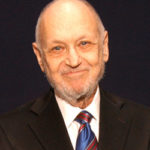 Happy Birthday to three-time Tony-winning composer Charles Strouse, born June 7, 1928, in New York, where he attended Townsend Harris H.S. After graduating from Eastman School of Music (1947), he studied with Aaron Copland and Nadia Boulanger. He met longtime collaborator Lee Adams at a party in 1949, and they started writing for revues including Shoestring Revue (1955), What’s the Rush (1956), The Littlest Revue (1956), Off the Top (1957), and Take Me to Your Leader (1959). To make ends meet, Strouse worked as an orchestrator for Movietone News, an accompanist for singing classes at the Actors Studio, and a rehearsal pianist for Your Show of Shows. During this time, he charted his first (and only) Top 10 hit with the Poni-Tails recording of “Born Too Late” (1958, lyrics by Fred Tobias), which you can listen to below.
Happy Birthday to three-time Tony-winning composer Charles Strouse, born June 7, 1928, in New York, where he attended Townsend Harris H.S. After graduating from Eastman School of Music (1947), he studied with Aaron Copland and Nadia Boulanger. He met longtime collaborator Lee Adams at a party in 1949, and they started writing for revues including Shoestring Revue (1955), What’s the Rush (1956), The Littlest Revue (1956), Off the Top (1957), and Take Me to Your Leader (1959). To make ends meet, Strouse worked as an orchestrator for Movietone News, an accompanist for singing classes at the Actors Studio, and a rehearsal pianist for Your Show of Shows. During this time, he charted his first (and only) Top 10 hit with the Poni-Tails recording of “Born Too Late” (1958, lyrics by Fred Tobias), which you can listen to below.
By 1959, Strouse and Adams had completed their first musical, A Pound in Your Pocket, an adaptation of The Old Curiosity Shop, which played Palm Beach, Fla., but didn’t make it to New York. Later that year, Strouse was rehearsal pianist for the Broadway musical Saratoga, when stage manager Edward Padula proposed an idea for a show about teenagers. Originally called Let’s Go Steady, it became Bye Bye Birdie (1960), which earned Strouse his first Tony Award and Grammy nomination. Below is Paul Lynde singing “Kids” at the 1971 Tonys.
Strouse’s next show, All American (1962), only ran two months but did include the Top 40 hit “Once upon a Time.” He fared better with Golden Boy (1964), earning his second Tony and Grammy nominations, but his next, It’s a Bird…It’s a Plane…It’s Superman (1966), closed after four months. Strouse then scored several films, including Bonnie and Clyde (1967) and The Night They Raided Minsky’s (1968). Below is Sammy Davis Jr. and the Golden Boy cast in “Don’t Forget 127th Street” on The Ed Sullivan Show.
Strouse began the 1970s with his second Tony win and third Grammy nod for Applause (1970). He followed this with the theme song for All in the Family (1971) and the musical I and Albert (1972) with Adams, as well as the song cycle Six (1971) and the musical Charlotte’s Web (1973), which he scored himself. Then came the mega-hit Annie (1977, lyrics by Martin Charnin), which brought Strouse another Tony Award and his first Grammy win. Later that year, Strouse founded the ASCAP Musical Theater Workshop. Below is the Annie cast performing a medley at the 1977 Tonys.
After Annie, Strouse saw a series of Broadway disappointments. A Broadway Musical (1978) closed on opening night, Charlie and Algernon (1980) closed after two weeks, Bring Back Birdie (1981) folded in two days, Dance a Little Closer (1983) lasted one night, Mayor (1985) only ran 70 performances, and Rags (1986) shuttered after four performances, though it did bring him both Tony and Drama Desk nominations. Below is Judy Kuhn singing the title song of Rags at the 1987 Tonys.
After several film and TV scores, including Ishtar (1987) and All Dogs Go to Heaven (1989), Strouse’s back luck continued on stage. Annie 2: Miss Hannigan’s Revenge (1989) closed during its out-of-town tryout, and Nick and Nora (1991) lasted one week on Broadway, though it did earn Strouse a Tony nod. Annie Warbucks (1993), a revision of Annie 2, was diverted from Broadway when a major investor pulled out, but it managed a respectable run of 200 shows Off-Broadway. Below are the kids of Annie Warbucks singing “The Other Woman” and “Love” on the MDA Telethon.
In 1996, Strouse earned his first Emmy for the new song “Let’s Settle Down” in the TV adaptation of Bye Bye Birdie. Two years later, he was back in the Top 40 with Jay-Z’s recording of “Hard Knock Life” from Annie, which you can watch below. In 2001, Strouse was inducted into the American Theatre Hall of Fame, and in 2008, he released his memoir, Put on a Happy Face.
Since 1991, Strouse has seen three revivals but no original musicals on Broadway, though he has several waiting in the wings, including Bojangles (1993) with Sammy Cahn, Marty (2002) with Lee Adams, and Minsky’s (2009) with Susan Birkenhead, as well as his own Real Men (2005), Dancing with Time (2005), and Martin (2011).
